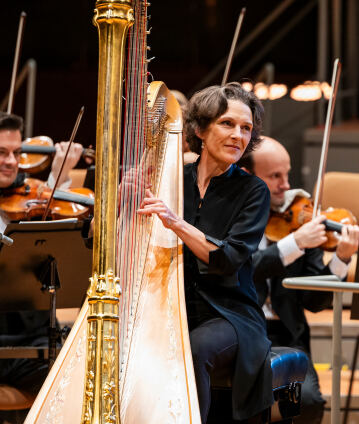French musical magic with Juanjo Mena

This programme is characterised by musical sophistication and French spirit – such as Maurice Ravel’s depiction of the lovers of antiquity, Daphnis et Chloé. With a sometimes delicate, sometimes archaic and austere tonal language, he portrays their timid falling in love, forced separation, and happy reunion. Harpist Marie-Pierre Langlamet is the soloist in Germaine Tailleferre’s impressionistic and virtuosic Concertino. Conductor Juanjo Mena opens the evening with the Ramuntcho Overture by Gabriel Pierné.
Without her father’s permission, the young Germaine Tailleferre secretly took piano and solfège lessons at the Conservatoire de Paris, where her talent was recognised and encouraged. She became the only female member of the notorious Groupe des Six, which formed around 1920 in the artists’ quarter of Montmartre in Paris. Tailleferre wrote her Concertino for Harp and Orchestra a few years later in Manhattan, where she lived during a short-lived marriage. The Classically styled piece is modelled on Mozart’s concertos; but at the same time, she wrote “music of such freshness – one could say that it smells good” (Darius Milhaud). Marie-Pierre Langlamet – a member of the Berliner Philharmoniker since 1993 – is the soloist in one of the most popular harp concertos of the 20th century.
When Juanjo Mena made his debut with the Berliner Philharmoniker in 2016, the conductor, known for his razor-sharp interpretations, also performed a work for harp and orchestra with Marie-Pierre Langlamet – in a programme that highlighted the mutual influences between Spain and France. The overture which opens his second programme also addresses this connection: the French composer Gabriel Pierné set Pierre Loti’s novel of the same name to music in the stage work Ramuntcho, which is considered a love letter to the Basque country.
Maurice Ravel wanted to create a “great musical fresco painting” with Daphnis et Chloé, “less concerned with antiquity than with faithfulness to the Greece of my dreams”. The premiere of the ballet in 1912, which the composer experienced as an “endless ordeal”, was overshadowed by a performance of Debussy’s infamously scandalous Prélude à l’après-midi d’un faune, which took place on the same evening. However, Ravel’s colourful pastoral piece was to be fully redeemed, initially in the form of two suites. And Igor Stravinsky declared that Daphnis et Chloé was for him one of the “most beautiful creations of all French music”.
© 2024 Berlin Phil Media GmbH
Related interviews
Artists
Our recommendations
- Simon Rattle conducts Stravinsky and Berio
- Gustavo Dudamel conducts Mahler’s Second Symphony
- Simon Rattle conducts Beethoven’s Symphony No. 9
- Adam Fischer conducts Mozart and Haydn
- Simon Rattle conducts “Weltethos” by Jonathan Harvey and Hans Küng
- Yannick Nézet-Séguin conducts Brahms’s “Ein deutsches Requiem”